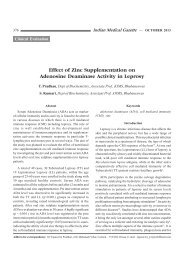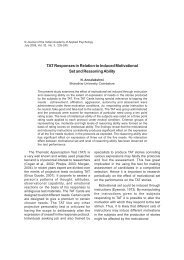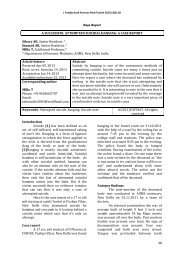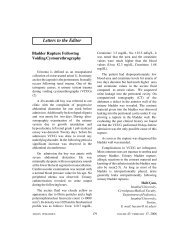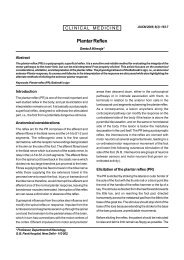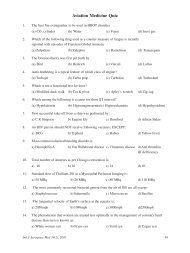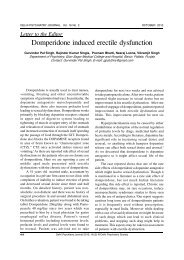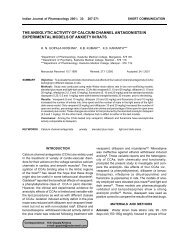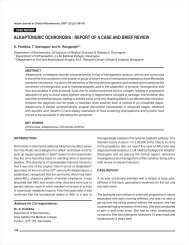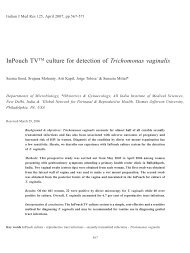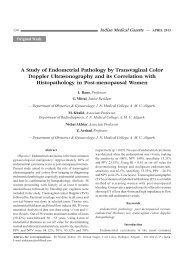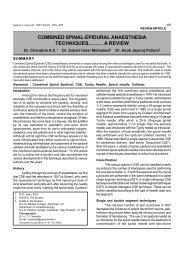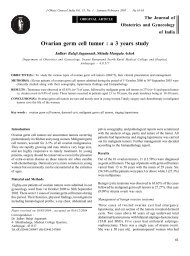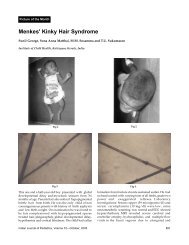Critics and Sceptics of Medico-legal Autopsy - medIND
Critics and Sceptics of Medico-legal Autopsy - medIND
Critics and Sceptics of Medico-legal Autopsy - medIND
Create successful ePaper yourself
Turn your PDF publications into a flip-book with our unique Google optimized e-Paper software.
J Indian Acad Forensic Med. October-December 2013, Vol. 35, No. 4 ISSN 0971-0973<br />
8. Don’t allow any unauthorized person into the<br />
mortuary while PME is going on. Being<br />
laymen, certain scientific facts/findings could<br />
be distorted after being leaked out by<br />
interested parties to the press that may lead<br />
to avoidable rumour mongering regarding<br />
the case. Such situations can show the<br />
forensic personnel in bad light. However,<br />
some exceptions can be made to this<br />
general rule- the Investigating Officer can be<br />
shown certain findings found on autopsy<br />
contrary to the inquest report. Allegations <strong>of</strong><br />
the relatives could be scientifically countered<br />
by showing them the findings on the dead<br />
body.<br />
9. The Medical Officer should not accede with<br />
the version <strong>of</strong> the relatives or the police<br />
while giving opinions which must be based<br />
honestly on the scientific facts.<br />
10. Prepare the PM Report simultaneously <strong>and</strong><br />
at the earliest <strong>and</strong> the original copy the PMR<br />
should preferably be h<strong>and</strong>ed over to the<br />
police. However, there is a recent Punjab &<br />
Haryana High Court Order on preparation <strong>of</strong><br />
medico-<strong>legal</strong> reports generated by computer<br />
<strong>and</strong> uploading the same on the web.<br />
11. Considering the inadequate infrastructure<br />
<strong>and</strong> manpower, the authors have evolved an<br />
alternative that in the first instance, h<strong>and</strong>written<br />
report is h<strong>and</strong>ed over to the police<br />
<strong>and</strong> later on a computerized report may be<br />
obtained after about a week. This will<br />
significantly lead to a decrease in paperwork<br />
<strong>and</strong> workload as only those cases in which<br />
the police file a charge sheet in the Hon’ble<br />
Courts may request for the same. Many<br />
times the police do not report to collect the<br />
computer generated reports.<br />
12. H<strong>and</strong> over the PM report <strong>and</strong> other articles<br />
only to an authorized police <strong>of</strong>ficial;<br />
As per settled principles <strong>of</strong> law, PM<br />
Report is not a public document. [9] In fact, the<br />
opinion <strong>of</strong> Medical <strong>of</strong>ficer contained in the postmortem<br />
report is only to aid the investigating<br />
<strong>of</strong>ficer in the investigation <strong>and</strong> this report is not a<br />
record <strong>of</strong> Medical Officer <strong>of</strong> his <strong>of</strong>ficial “act” for<br />
use <strong>of</strong> the public <strong>and</strong>, thus not a public<br />
document covered under sections 74 <strong>and</strong> 76 <strong>of</strong><br />
Indian Evidence Act. [10]<br />
Therefore, post-mortem report being an<br />
expert opinion can be given only on specific<br />
orders <strong>of</strong> the court, on clear direction regarding<br />
issuing <strong>of</strong> the same, whether the post-mortem<br />
report is to be supplied to the applicant or not.<br />
Postmortem examination - when <strong>and</strong> whom<br />
held- the <strong>legal</strong> requirement in respect <strong>of</strong><br />
postmortem examination by a qualified surgeon<br />
are contained in section 174(3), code <strong>of</strong> criminal<br />
procedure. [1]<br />
In every case where death appears to<br />
have been due to suicidal, homicidal, accidental<br />
or suspicious causes <strong>and</strong> where any doubt<br />
exists as to the exact cause <strong>of</strong> death, or if it<br />
appears to the <strong>of</strong>ficer conducting the<br />
investigation whether under section 157 [1] or<br />
section 174, code <strong>of</strong> criminal procedure [1]<br />
expedient to do so, the body shall be sent to the<br />
nearest medical <strong>of</strong>ficer authorized by the local<br />
government to conduct postmortem<br />
examination. The sending <strong>of</strong> the body for<br />
examination may only be dispensed with, where<br />
such action is otherwise required when condition<br />
exist, such as advanced putrefaction, which<br />
would clearly makes examination useless.<br />
Many a times, it has been observed that<br />
after the post-mortem the attendants request for<br />
keeping the dead body in the cold storage <strong>and</strong><br />
to take the body on the next day. Such a request<br />
may be considered depending upon the<br />
circumstances related to the availability <strong>of</strong> cold<br />
storage <strong>and</strong> if at all it is allowed, these bodies<br />
should be kept separately to avoid mixing with<br />
other cadavers in the mortuary.<br />
Ordinarily, a dead body is sent to the<br />
morgue for autopsy, but in exceptional cases [2]<br />
the medical <strong>of</strong>ficer may be taken to visit the<br />
scene <strong>of</strong> death. Preferably, this practice should<br />
be avoided as far as possible because it will<br />
increase the workload on already meagre<br />
number <strong>of</strong> experts.<br />
The medical <strong>of</strong>ficer must establish the<br />
identity <strong>of</strong> the deceased before the start <strong>of</strong> the<br />
post-mortem by at least one relative or<br />
accompanying person <strong>and</strong> the police <strong>of</strong>ficial.<br />
The signatures should be obtained on the postmortem<br />
report before the start <strong>of</strong> the autopsy. In<br />
cases <strong>of</strong> unidentified dead bodies, it is the<br />
primary duty <strong>of</strong> the Police personnel<br />
accompanying the dead body to identify such<br />
bodies before the start <strong>of</strong> the autopsy. This is<br />
very essential as there may be mixing <strong>of</strong> such<br />
unclaimed dead bodies in the mortuary leading<br />
on to autopsy <strong>of</strong> wrong bodies as has been<br />
reported in literature.<br />
All the details <strong>of</strong> the post-mortem<br />
observed by the medical <strong>of</strong>ficer should be<br />
carefully entered by him on the spot in the postmortem<br />
report or in a notebook but whenever<br />
the rough notes are prepare, the same should<br />
be preserved, which can be used as evidence in<br />
a <strong>legal</strong> inquiry in case a serious discrepancy<br />
arises in the report submitted to police <strong>and</strong> the<br />
notes. He should not mind the report getting<br />
soiled; this will enhance its value, inasmuch as it<br />
goes to prove that it was written at the time<br />
375



